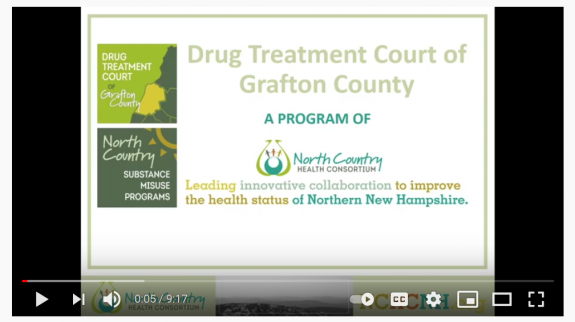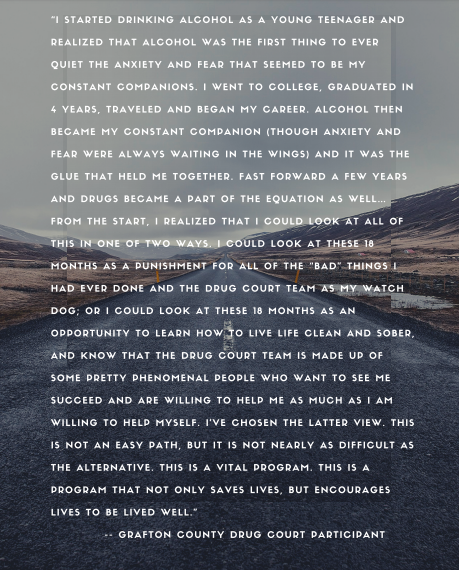
Drug Treatment Court
What is Drug Treatment Court (DTC)?
The Drug Treatment Court (DTC) system provides and combines intensive treatment with strict supervision, giving individuals with Substance Use Disorder (SUD) the opportunity to pursue SUD treatment and recovery over a lengthy prison sentence. The New Hampshire Judicial Branch provides oversight to the drug court team that delivers comprehensive services. The drug court team is made up of a Judge, prosecuting attorney, public defender, probations and parole officer, local law enforcement, treatment representative, a DTC program manager, and case manager.
DTC of Grafton County
The Drug Treatment Court of Grafton County oversees individuals who are charged with crimes that are generally non-violent in nature. The participants receive intensive supervision and treatment rather than a lengthy prison term. The program is voluntary and gives the participants the opportunity to live a productive substance-free life.
The Drug Treatment Court of Grafton County is managed by the North Country Health Consortium. Hear what staff and past participants have to say about the Drug Treatment Court of Grafton County program:

Drug Treatment Courts Facts
- Drug courts are six times more likely to keep offenders in treatment long enough for them to get better.
- The most rigorous and conservative scientific estimates and analyses have all concluded that drug courts significantly reduce crime as much as 35 percent compared to the alternatives.
- In nationally representative studies of more than 2,000 graduates from over 90 Drug Courts, the average recidivism rate was only 16 percent in the first year after leaving the program, and 27 percent after the second year. This compares very favorably to recidivism rates on conventional probation, in which 46 percent commit a new offense and over 60 percent commit a probation violation.
- Drug Court’s effects on crime can last for years, if not decades. In rigorous experimental studies, reduction in crime lasted at least 3 years and longer-term effects are still being evaluated by the researchers.
- Drug Courts preserve families and save abused and neglected children. Parents in Family Drug Courts are more likely to go to treatment and complete it.
- Their children spend significantly less time in out-of-home placements such as foster care.
- Drug Courts save taxpayers considerable money. Studies reveal average cost savings ranging from more than $4,000 to more than $12,000 per client.

Contact Us
Drug Treatment Court of Grafton County
3801 Dartmouth College Highway
North Haverhill, NH 03774Phone: (603)707-5054
Fax: (603)243-0222
Email: rakesson@NCHCNH.org
